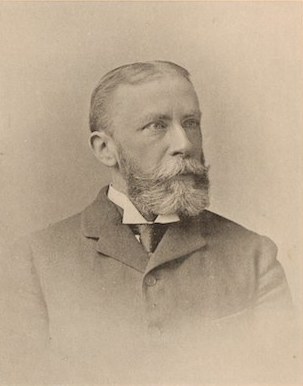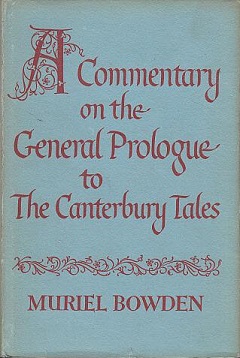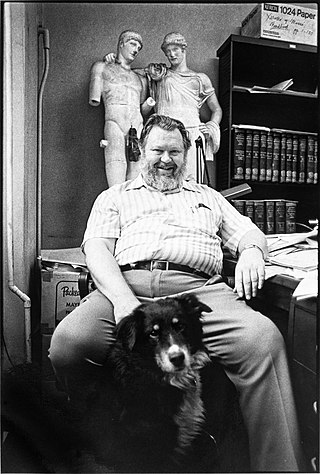
Ars antiqua, also called ars veterum or ars vetus, is a term used by modern scholars to refer to the Medieval music of Europe during the High Middle Ages, between approximately 1170 and 1310. This covers the period of the Notre-Dame school of polyphony, and the subsequent years which saw the early development of the motet, a highly varied choral musical composition. Usually the term ars antiqua is restricted to sacred (church) or polyphonic music, excluding the secular (non-religious) monophonic songs of the troubadours, and trouvères. Although colloquially the term ars antiqua is used more loosely to mean all European music of the 13th century, and from slightly before.
The Dialogue on Translation between a Lord and a Clerk, or Dialogus inter dominum et clericum, was written by John Trevisa. Along with the dedicatory Epistle, it forms the introduction to his 1387 translation of the Polychronicon of Ranulf Higden, commissioned by Trevisa's patron, Lord Berkeley. Written in Middle English, it consists of a series of arguments made by the clerk on why books should not be translated from learned languages such as Latin, each one followed by a rebuttal from the lord. The clerk eventually agrees, and the exchange concludes with a prayer for guidance in the translation.

Ernst Hartwig Kantorowicz was a German historian of medieval political and intellectual history and art, known for his 1927 book Kaiser Friedrich der Zweite on Holy Roman Emperor Frederick II, and The King's Two Bodies (1957) on medieval and early modern ideologies of monarchy and the state. He was an elected member of both the American Philosophical Society and the American Academy of Arts and Sciences.

Ephraim Emerton was an American educator, author, translator, and historian prominent in his field of European medieval history.

The medieval genre of speculum literature, popular from the twelfth through the sixteenth centuries, was inspired by the urge to encompass encyclopedic knowledge within a single work. However, some of these works have a restricted scope and function as instructional manuals. In this sense the encyclopedia and the speculum are similar, but they are not the same genre.

Nellie Neilson was an American historian. She was the first female president of the American Historical Association and the first woman to have an article published in the American Historical Review.
Gabrielle Michele Spiegel is an American historian of medieval France, and the current Krieger-Eisenhower Professor of History at Johns Hopkins University where she served as chair for the history department for six years, and acting and interim dean of faculty. She also served as dean of humanities at the University of California, Los Angeles in 2004–2005, and, from 2008 to 2009, she was the president of the American Historical Association. In 2011, she was elected as a fellow to the American Academy of Arts and Sciences.

A Commentary on the General Prologue to The Canterbury Tales is a 1948 doctoral dissertation by Muriel Bowden that examines historical backgrounds to characters in Geoffrey Chaucer's The Canterbury Tales within the context of its General Prologue.
Mediaeval and Renaissance Studies was a periodical of the Warburg Institute that was published between 1941 and 1968. It was conceived as a companion to the Journal of the Warburg and Courtauld Institutes, with each edition including a number of short specialist studies of an aspect of Medieval or Renaissance thought.
Jane Chance, also known as Jane Chance Nitzsche, is an American scholar specializing in medieval English literature, gender studies, and J. R. R. Tolkien. She spent most of her career at Rice University, where since her retirement she has been the Andrew W. Mellon Distinguished Professor Emerita in English.
Allen J. Frantzen is an American medievalist with a specialization in Old English literature. Since retiring from Loyola University Chicago, he has been an emeritus professor.

Colin Robert Chase was an American academic. An associate professor of English at the University of Toronto, he was known for his contributions to the studies of Old English and Anglo-Latin literature. His best-known work, The Dating of Beowulf, challenged the accepted orthodoxy of the dating of the Anglo-Saxon poem Beowulf—then thought to be from the latter half of the eighth century—and left behind what was described in A Beowulf Handbook as "a cautious and necessary incertitude".

Caroline Agnes Brady was an American philologist who specialised in Old English and Old Norse works. Her works included the 1943 book The Legends of Ermanaric, based on her doctoral dissertation, and three influential papers on the Anglo-Saxon poem Beowulf. She taught at the University of California, Berkeley, the University of Pennsylvania, Johns Hopkins University, and Harvard University, among other places.

Robert Earl Kaske was an American professor of medieval literature. He spent most of his career at Cornell University in Ithaca, New York, where he was the Avalon Foundation Professor in the Humanities, and where he founded one of the preeminent medieval studies graduate programs in North America. His published output included lengthy interpretations of Beowulf and of poems and passages by Dante and Chaucer, and frequently constituted leading studies. Kaske particularly enjoyed solving cruxes, with articles on problematic passages in works such as Pearl, Piers Plowman, the Divine Comedy, The Husband's Message, The Descent into Hell, and Beowulf.
Constance Bartlett Hieatt was an American scholar with a broad interest in medieval languages and literatures, including Old Norse literature, Anglo-Saxon prosody and literature, and Middle English language, literature, and culture. She was an editor and translator of Karlamagnús saga, of Beowulf, and a scholar of Geoffrey Chaucer. She was particularly known as one of the world's foremost experts in English medieval cooking and cookbooks, and authored and co-authored a number of important books considered essential publications in the field.
Grace Mayer Frank was an American medievalist and lecturer. Frank, along with her spouse, the classicist Tenney Frank, was primarily associated with Bryn Mawr College, first as a graduate student, and later as a Lecturer and Associate Professor of Romance Philosophy and Old French. Beginning in 1919, Frank lived in Baltimore, Maryland, where she would reside for the majority of her life, serving also as a Visiting Professor of Romance Philology at Johns Hopkins University in that city.
Margaret E. Wood, later Margaret Kaines-Thomas was an English archaeologist and author specialising in the domestic and vernacular architecture of the Middle Ages.
This is a select bibliography of post-World War II English-language books and journal articles about the Early Slavs and Rus' and its borderlands until the Mongol invasions beginning in 1223. Book entries may have references to reviews published in academic journals or major newspapers when these could be considered helpful.
Joan Marguerite Aida Ferrante is an American scholar of medieval literature.
Laura Alandis Hibbard Loomis was an American literary scholar and college professor who specialized in medieval English literature.









